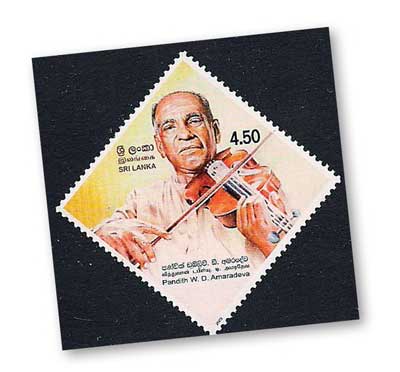Thursday Dec 12, 2024
Thursday Dec 12, 2024
Saturday, 5 November 2016 00:10 - - {{hitsCtrl.values.hits}}
By D.C. Ranatunga
“Our country’s gift to the world of international music, the voice that is the greatest musical instrument in the country,” as our doyen of cinema Lester James Peries describes Pandit Amaradeva, makes his last journey today as Sri Lanka observes a week of mourning.
“His music, at its best, for its supreme artistry and sensitivity is unsurpassed and his songs in their gentle reverberations evoke the memories of our beautiful land, of our people, of our musical folk heritage as few songs have been able to do,” says Lester JP.
During half a century of my association with Pandit Amaradeva, there are many moments I will never forget. At my last meeting with him in Sydney in August last year, we chatted about the old days. He was relaxing before taking off to Brisbane.
Son Ranjana ensured that there would be no visitors to disturb him. At the end of the concert the previous evening, I noticed he was exhausted. He did not disappoint the audience. He tried his best to maintain his old form. Immediately after the concert he was whisked away though there were many who wished to have a word with him. We knew it would be his final visit to Australia where  Sri Lankans simple adore him. They had turned up in numbers to fill the hall.
Sri Lankans simple adore him. They had turned up in numbers to fill the hall.
I missed his last concert ‘Sasara Vasana Thru’ in Colombo but Ranjan had brought me a copy of the DVD. No sooner I came home I sat and watched it. I was so moved with Nimal Mendis’ gesture. Nimal walks up, meets Pandit Amaradeva and says, “He is a unique artiste, a unique voice, a very humble man and a national treasure.” Pandit Amaradeva hugs him. The audience applaud. How true, I thought!
Nimal then starts singing the song he composed after his wife passed away in 2010 – ‘Yesterday, Today or Tomorrow’ accompanied by Soundarie David Rodrigo on the piano and the Soul Sounds Group. As he winds up Pandit Amaradeva starts the Sinhala version, ‘Nim Him Sevva Ma Sasare’ – the song he sang in Manik Sandarasagara’s film, ‘Sitadevi’. Nimal, who directed the music, had used both versions The Sinhala words were done by Augsutus Vinayagaratnam. The English version was sung by Desmond de Silva.
I had hardly missed any of Pandit Amaradeva’s concerts. Earlier, when we only heard his voice over Radio Ceylon I used to record them on audio cassettes. That was the era when CDs were not in vogue.
For his 86th birthday I presented him the book I did on him. ‘The Musical Genius’ is a selection of my writings about him over the years. I did not plan a launch. Head of Sarasavi Publishers H.D. Premasiri and I went to his place in the morning and handed over a few copies. He was very pleased. We sat and talked. Wife Wimala was answering the telephone – friends wishing him.
Apart from my own writings I included a chapter on what Lester JP thought about him. In what he described as his favourite snapshot of the master composer, he says: He would sit quietly in a corner watching you and listening to you with intense concentration. You as the Director would discuss the story of your film, expatiate on its theme and characters, give indications of where you felt music would help most. There he would sit a gentle smile on his face, the flicker of irony lighting up the eyes, but the gaze would be focussed somewhere slightly off you – as though he was looking at something else, wrapped up in his own private  dream, concentrating on an inner vision to which you had no access, hearing melodies and patterns of sound which he was, at least for the moment, unwilling to share.
dream, concentrating on an inner vision to which you had no access, hearing melodies and patterns of sound which he was, at least for the moment, unwilling to share.
He adds: “Different films needed different talents and he was big enough to accept the premise. This is one of the most endearing traits of Amaradeva – his great, unflappable, unruffled equanimity, serene almost to a point where you begin to wonder whether he quite belongs to our other more mundane world of petty squabbles over fees, contracts, deadlines, recording schedules, etc. True, an occasional detractor will say – but he is disorganised, impractical, unpunctual, a dreamer. But of course he is all these things. It is a part of his make-up, part of the serenity of his character. It would not be Amaradeva, the maestro, if he worked like a computer. We have found him endearing, despite his little foibles, indeed because of them.”
Among the many accolades he got during his musical career, one of the most prestigious ones was the 2001 Magsaysay Award for Journalism, Literature and Creative Communication Arts. It was awarded recognising “his life of dazzling creativity in expression of the rich heritage and protean vitality of Sri Lankan music”.
After he returned from Manila, over a hundred singers gathered one evening to felicitate him. They lined the BMICH steps. Before them were a few thousands of ‘rasikas’. In one voice they sang a medley of Amaradeva’s songs produced over the past five decades – a fine gesture honouring the greatest musician Sri Lanka has produced. Never had we seen so many artistes getting together to pay homage to someone whom they respected and accepted as the leader. They called the evening ‘Amara Guru Sara’.
Pandit Amaradeva is no more but we will continue to hear his voice – possibly even more than he was alive.
Pix by Shehan Gunasekara